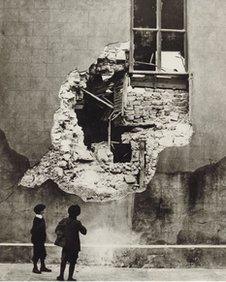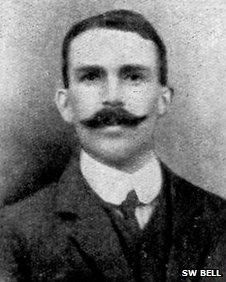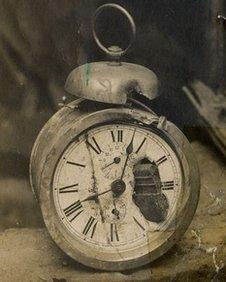WWI commemorations: Hartlepool's bombardment remembered
- Published

The Baptist church in Hartlepool was among the buildings damaged in 1914
On the morning of 16 December 1914 Hartlepool was bombed by the German Navy.
It was the first major home attack of World War I, leaving 119 civilians dead and hundreds more injured.
Theophilus Jones, a 29-year-old private in the Durham Light Infantry (DLI), was hit by a shell, securing his place in history as the first soldier to be killed on British soil during the conflict.
Pte Jones's story, and the bombardment of the North East coast, is the focus of Teesside's project to commemorate next year's 100th anniversary of the start of the war.
The £400,000 programme of events, launched at the Heugh Gun Battery on Hartlepool's headland, will focus on making local museum artefacts more widely seen and encouraging children to learn about their own families' involvement.
Hartlepool Borough Council's senior WWI project officer, Katie Hammond, said: "We're now getting to a time where there's a whole generation of young people that haven't had that one-to-one contact with a First World War veteran or people who have lived through that time.
"They need to be reminded of what happened and how that changed and shaped the social fabric of the country that they live in today."
'Men of Britain!'
Although Pte Jones is almost universally credited with being the first soldier to die during the bombardment, conclusive evidence is scarce.

Theophilus Jones is said to be the first soldier to die on home soil in WWI
The Commonwealth War Graves Commission can only narrow it down to six members of the 18th battalion of the DLI killed on duty that day.
Walter Rogers, LD Turner, Alix Oliffe Liddle, CS Clarke and Thomas Minks - all from County Durham or Teesside - were with Pte Jones as the battery returned fire.
One was certainly the first to die and Hartlepool council WWI project officer Christine Hutchinson suggests Jones might have been selected "for propaganda purposes".
The government had already used the bombardment - which also hit the undefended towns of Scarborough and Whitby - for a campaign encouraging men to enlist.
Recruitment posters asked: "Men of Britain! Will you stand this?"
Miss Hutchinson believes having a "personal element" helped make the events "more real", both then and now.
Much of Pte Jones's story makes it compelling.
'Irrevocable impact'
He was a young head teacher in Leicestershire but returned home to West Hartlepool to serve his country, one of the first to volunteer when war broke out.
A shard of the shell which hit his chest was found lodged in a prayer book given to him by his pupils, it was claimed.

A damaged alarm clock shows the time of the bombardment
Hundreds of people are said to have turned out for his funeral.
"It's important to us that we are helping to inspire and educate the young generation who may not know about the war," Miss Henderson said.
Hartlepool's part in it is "not as widely known as it should be", she added.
The town's ceremonial mayor Stephen Akers-Belcher said the war had brought "massive social change".
"Thanks to this generous funding from Arts Council England, the Tees Valley councils will be able to help the people of today to explore and understand the massive and irrevocable impact which it had on their local communities," he said.
"I am sure it will be a fascinating, poignant and very fitting commemoration of the 100th anniversary of 'the war to end all wars'."
- Published10 June 2013
- Published10 June 2013
- Published31 March 2013